

7 Key California Laws Emotional Support Animals You Should Know
by Lena Park
Last updated: July 10, 2025
Verified and Approved by:
Angela Morris,
MSW, LCSW
Fact Checked

Overview
This article highlights the essential laws and regulations regarding emotional support animals (ESAs) in California, with a particular focus on California Assembly Bill 468 and the Fair Housing Act. These laws are designed to protect legitimate ESA owners from fraud while safeguarding their rights to housing and travel.
They provide crucial legal protections for individuals with mental health needs, ensuring that those who rely on their emotional support animals can feel secure and supported.
For many, the journey of navigating mental health challenges can be overwhelming. The presence of an ESA can offer profound emotional relief, serving as a source of comfort and companionship.
With the backing of these laws, individuals can find reassurance in knowing that their rights are protected, allowing them to travel and reside in their homes with their beloved animals.
The evidence shows improved compliance and legal protections, reinforcing the importance of these measures in supporting the mental well-being of individuals.
If you are facing these challenges, remember that there is support available to help you navigate this journey with your ESA by your side.
Introduction
In California, many individuals facing emotional challenges are seeking the companionship of emotional support animals (ESAs), leading to an increased demand for services that simplify the process of obtaining ESA letters. As awareness around mental health grows, navigating the complex landscape of regulations and requirements can feel overwhelming. It’s important to understand the distinctions between service animals and ESAs, as well as the implications of the Fair Housing Act.
This article will explore the essential aspects of ESA ownership, including the vital role of licensed professionals, public access rights, and the financial considerations involved. As the legal framework evolves, so too does our understanding of how these cherished companions can profoundly enhance the quality of life for those in need.
Have you ever felt the comfort that a loving pet can provide during difficult times? The journey to obtaining an ESA letter may offer you the support and companionship you deserve.
Wellness Wag: Streamlined ESA Letter Services for California Residents
Navigating mental health challenges can be incredibly difficult, often leaving individuals feeling isolated and overwhelmed. For those in California, Wellness Wag offers a compassionate solution through an efficient and user-friendly process for obtaining Emotional Support Animal (ESA) letters, adhering to California laws on emotional support animals. The journey begins with a brief assessment to establish eligibility, followed by a heartfelt consultation with licensed medical professionals who genuinely evaluate individual needs. After placing an order, clients receive a confirmation email detailing their purchase, providing a sense of reassurance during this important process.
Clients can expect to receive their official ESA letter within 24 hours of approval, a crucial feature for those facing housing restrictions or travel challenges due to mental health conditions. This rapid response is particularly significant, given the increasing demand for ESA letters as specified by California laws on emotional support animals, where timely access can greatly enhance individuals’ quality of life. Wellness Wag fosters customer trust with a money-back guarantee, ensuring that clients feel secure in the authenticity of their offerings.
As Linda S. shares, “Applying for an ESA through Wellness Wag was the best decision I made. It was an effortless process and the team was very professional.” This dedication to prompt and dependable assistance positions Wellness Wag as a leader in the evolving landscape of California laws concerning emotional support animals letter services. As cultural perspectives shift and the demand for emotional companions continues to grow, Wellness Wag stands ready to support individuals on their journey toward emotional well-being.
California AB 468: Key Regulations for Emotional Support Animals
California Assembly Bill 468, effective January 1, 2022, introduces vital regulations in California laws regarding emotional support animals (ESAs) that aim to combat fraudulent practices. According to California laws regarding emotional support animals, individuals seeking an ESA letter must establish a 30-day relationship with a licensed mental health professional. This requirement ensures that only those with genuine emotional or psychological needs can obtain an ESA letter, enhancing the legitimacy of the process.
Many individuals struggle with mental health issues, and the presence of an ESA can provide comfort and support. According to California laws regarding emotional support animals, AB 468 mandates that healthcare providers conduct a thorough clinical evaluation before issuing an ESA letter. This crucial step helps maintain the integrity of the system and protects the rights of legitimate ESA owners. Since the implementation of California laws emotional support animals, there has been a significant decrease in fraudulent ESA letters, reinforcing the importance of these new regulations.
Before AB 468 was enacted, reports indicated a troubling incidence of fraudulent ESA letters, leading to increased scrutiny from landlords and housing authorities. The law has successfully reduced such cases, highlighting the importance of compliance. Legal experts emphasize that California laws regarding emotional support animals not only protect the rights of ESA owners but also ensure that the emotional assistance these animals provide is recognized and valued.
Furthermore, the civil penalty for misrepresenting an emotional assistance dog begins at $500 for the first infraction, rising to $1,000 for the second and $2,500 for the third and any subsequent violations. This underscores the seriousness of adhering to the law.
Consider the case of a tenant facing eviction due to an unauthorized pet. This individual sought legal advice while in the process of obtaining an ESA through the VA. By promptly applying for the ESA and providing the necessary documentation from a mental health professional, the tenant was able to retain their pet and secure their housing. This example illustrates how the law not only minimizes fraudulent claims but also assists legitimate ESA owners in protecting their rights.
Overall, California AB 468 represents a significant advancement in the management of california laws emotional support animals letters, ensuring that these animals genuinely aid those in need while limiting deceitful claims. As Susana Bradford notes, “No. Accessories – such as special certificates, ID cards, vests, harnesses, tags, or leashes – are not necessary to legitimize an ESA,” reinforcing the idea that compliance and legitimacy are paramount.
If you have questions or concerns about this Privacy Policy, please reach out by sending an email to [email protected]. For those interested in obtaining a legitimate ESA letter, Wellness Wag offers streamlined telehealth services to assist you in this process.
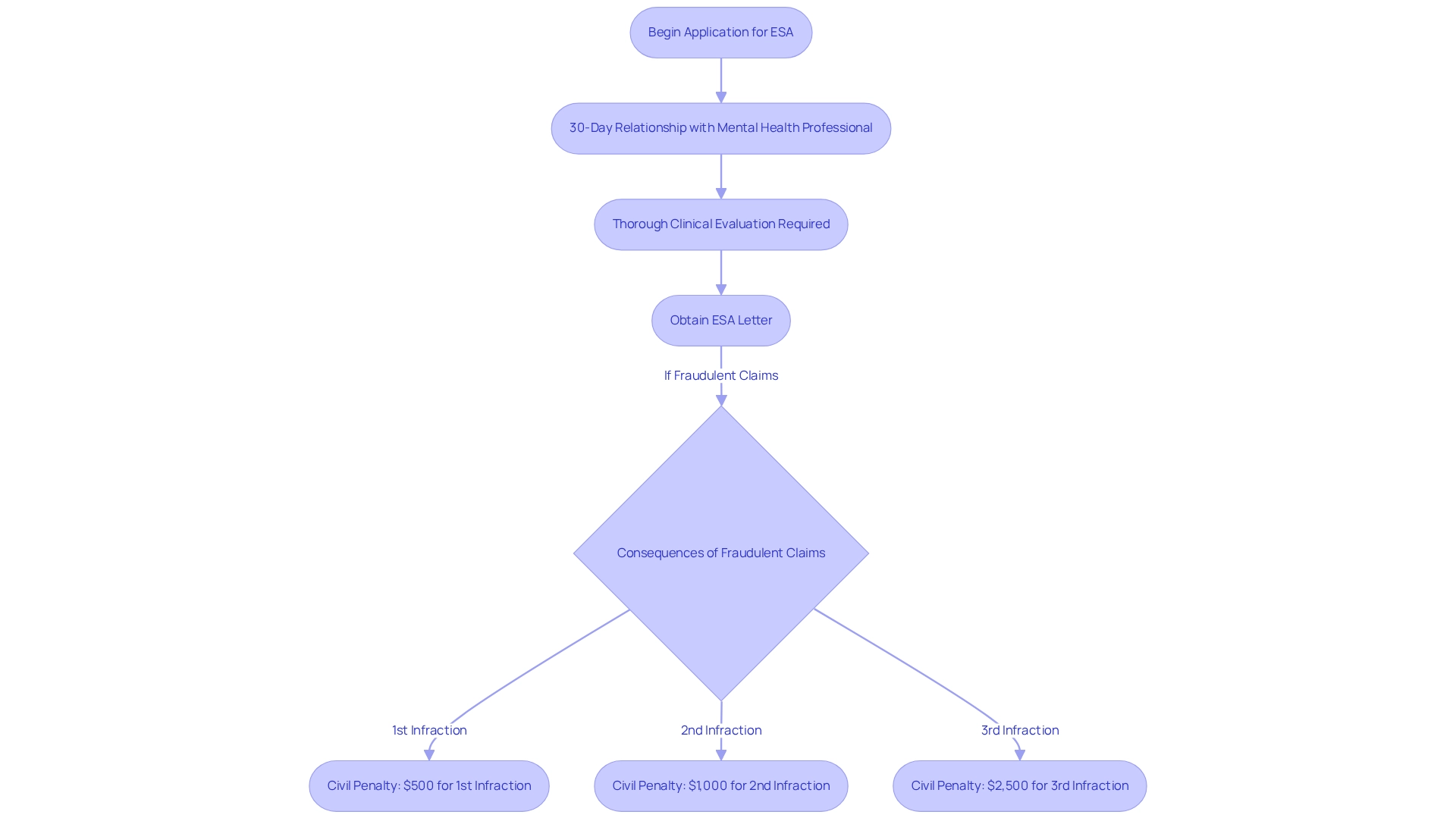
Service Animals vs. Emotional Support Animals: Understanding the Differences
Service creatures and emotional support companions (ESAs) play distinct roles in our lives, each governed by unique legal frameworks that reflect their importance. Service animals, particularly dogs trained to assist individuals with disabilities, enjoy public access rights under the Americans with Disabilities Act (ADA). This vital protection allows them to accompany their handlers in various settings—restaurants, stores, and public transport—offering essential support. While assistance dogs are not legally required to be certified or registered, obtaining certification from recognized organizations can lend credibility and ensure they have received proper training. This can be beneficial for assistance dog owners, as it clarifies their rights and responsibilities under the law, helping them navigate their journeys with confidence.
In addition to public access rights, assistance dog owners are entitled to housing accommodations, even in places where pets are typically restricted. This aspect of their rights is crucial, as outlined in the ADA and related regulations, ensuring that they can live comfortably with their companions.
On the other hand, emotional support creatures provide therapeutic benefits through companionship, yet they do not carry the same public access privileges. Their primary role is to alleviate emotional distress, making them invaluable for individuals coping with anxiety, depression, or PTSD. While emotional support animals can be helpful in housing situations, their rights are primarily protected under the Fair Housing Act, which allows individuals to seek reasonable accommodations in pet-restricted housing, in accordance with California laws regarding emotional support animals. Understanding these differences is essential for ESA owners, especially when navigating housing and travel regulations. For instance, while an assistance creature can accompany its handler in most public environments, an ESA may only be permitted in specific situations, such as within the home or on flights, provided the necessary documentation is presented.
Statistics reveal a growing awareness of these distinctions. In the U.S., the number of registered assistance creatures is significantly lower than that of emotional support creatures, with recent surveys highlighting that many people are unaware of the differences between the two. This underscores the need for public education about their respective roles. Misrepresentation of assistance creatures can undermine the credibility of genuine support dogs and potentially threaten public safety.
Real-world examples illustrate the importance of adhering to these legal definitions. The case study titled ‘Importance of Proper Administration of Animal Laws’ emphasizes that appropriate management and respect for laws concerning assistance creatures and emotional support creatures are vital for maintaining their intended functions and safeguarding the integrity of these classifications. Ensuring that only qualified creatures are recognized as service beings or emotional assistance beings fosters trust in these roles, which is crucial for their effective support of individuals with disabilities. As the landscape of animal-assisted support continues to evolve, it is imperative for both ESA owners and the broader community to stay informed about California laws regarding emotional support animals. Moreover, a survey indicated that 9.9% of participants believe pet ownership would not influence their mental well-being, highlighting the wider social context of emotional companions and their perceived benefits.
Fair Housing Act: Protections for Emotional Support Animal Owners
The Fair Housing Act (FHA) is a vital pillar of legal protections under California laws for individuals with emotional support animals. According to California laws regarding emotional support animals, this important legislation requires landlords to provide reasonable accommodations for tenants with ESAs, even in properties that typically do not allow pets. This means that ESA owners are exempt from additional pet fees or deposits, easing the financial strain often associated with finding suitable housing. Such a legal framework is essential in ensuring that individuals with disabilities can secure homes that cater to their emotional support needs as outlined by California laws regarding emotional support animals.
Experts in housing law emphasize the significance of the FHA in protecting tenant rights under California laws regarding emotional support animals. They recognize that individuals with mental impairments may need more than one ESA, showcasing the law’s flexibility in addressing diverse needs. Jonalyn Dionio poignantly notes, “The FHA guidelines recognize that individuals with mental impairment may need more than one ESA,” underscoring the importance of understanding the provisions this law offers.
Moreover, real-life case studies illustrate the effectiveness of California laws regarding emotional support animals in practice. Tenants with valid ESA letters have successfully challenged landlords who attempted to deny their animals, which reinforces the necessity of proper documentation as outlined in California laws regarding emotional support animals. One notable case involved a tenant who faced denial of their ESA despite having the correct documentation, leading to a legal challenge that affirmed their rights under the FHA.
Statistics reveal that a significant percentage of landlords adhere to California laws regarding emotional support animals (ESAs), fostering a more inclusive environment for tenants. Recent data indicates that compliance rates are steadily improving, reflecting a growing awareness of the rights of ESA owners. In Alabama, businesses selling fraudulent ESA letters face civil penalties up to $3,000, emphasizing the importance of legitimate ESA documentation and the consequences of non-compliance.
Understanding the distinctions between ESAs and assistance dogs is also crucial, particularly concerning their legal rights and access according to California laws regarding emotional support animals. While service dogs are not required to be certified or registered, obtaining certification can lend credibility and ensure that the dog has received proper training, as protected by the Americans with Disabilities Act (ADA). Service dog owners enjoy full public access rights, allowing them to bring their dogs into various public spaces, including restaurants and stores, which is a critical distinction from ESA regulations.
Additionally, understanding California laws on emotional support animals is essential, as state laws can either enhance or limit federal rights, providing a more nuanced understanding of the legal landscape surrounding ESAs. This trend is vital, as it not only assists individuals facing mental health challenges but also nurtures a culture of understanding and acceptance within the housing market.
In conclusion, the Fair Housing Act serves as a robust resource for emotional support animal owners, ensuring their rights are protected under California laws regarding emotional support animals and their needs are met in the housing environment.
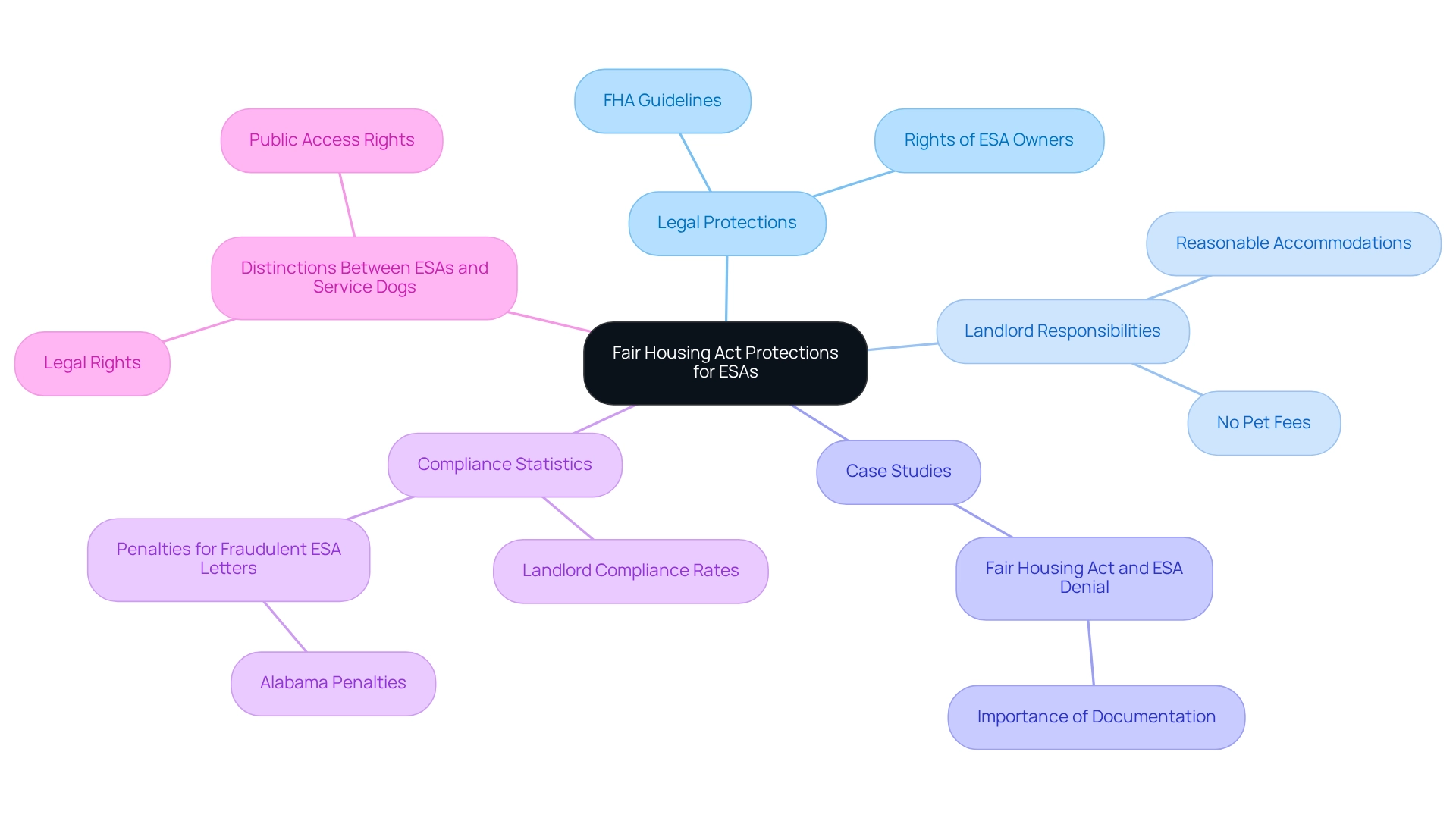
Air Carrier Access Act: Traveling with Your Emotional Support Animal
The Air Carrier Access Act (ACAA) has undergone significant changes that affect the travel rights of emotional support animals under California laws. Emotional support animals (ESAs) could accompany their owners in the cabin of commercial flights without restrictions in the past, providing comfort and companionship. However, recent modifications have created a more complex landscape, as airlines are no longer obligated to treat ESAs the same as service animals. This shift means that ESA owners now need to verify individual airline policies, which may include additional pet fees or specific travel guidelines.
As we approach 2025, approximately 30% of airlines have implemented charges for traveling with emotional support animals, highlighting a growing trend towards stricter regulations. This change can understandably cause concern for many pet owners who seek clarity on their rights and the necessary documentation for traveling with their emotional support animals, especially regarding California laws. Importantly, experts emphasize that while these ACAA modifications present challenges, they also encourage a more standardized approach to traveling with animals, ensuring that support is provided only to those with genuine needs.
Case studies reveal that the prevalence of assistance animals varies greatly across regions, influenced by societal attitudes and economic factors. In the U.S., assistance dogs are widely recognized and supported, while other countries, such as Canada, face long waitlists for support dog training due to high demand. This disparity underscores the necessity of understanding local regulations and airline policies when planning travel with an ESA.
Service dogs, in particular, undergo extensive training through specialized programs and professional trainers to perform tasks directly related to their handler’s disabilities, such as guiding individuals with visual impairments or alerting deaf individuals to important sounds. Although there is no legal requirement for assistance dogs to be certified, obtaining certification from recognized organizations can lend credibility and assurance that the assistance dog meets specific training standards. This distinction is crucial for ESA owners to understand, especially in light of the evolving landscape of animal assistance roles.
Additionally, service dogs are granted specific rights under the Americans with Disabilities Act (ADA), ensuring their access to public spaces and accommodations, while California laws regarding emotional support animals also provide important protections. As airlines continue to adapt their policies, it is vital for ESA owners to remain informed about their rights under the ACAA and to prepare for potential changes in travel requirements. Taking a proactive approach will help ensure a smoother travel experience for both the owner and their emotional companion. It is also important to note that the final rule regarding these changes will take effect 30 days after publication in the Federal Register, marking a significant timeline for ESA owners to consider.
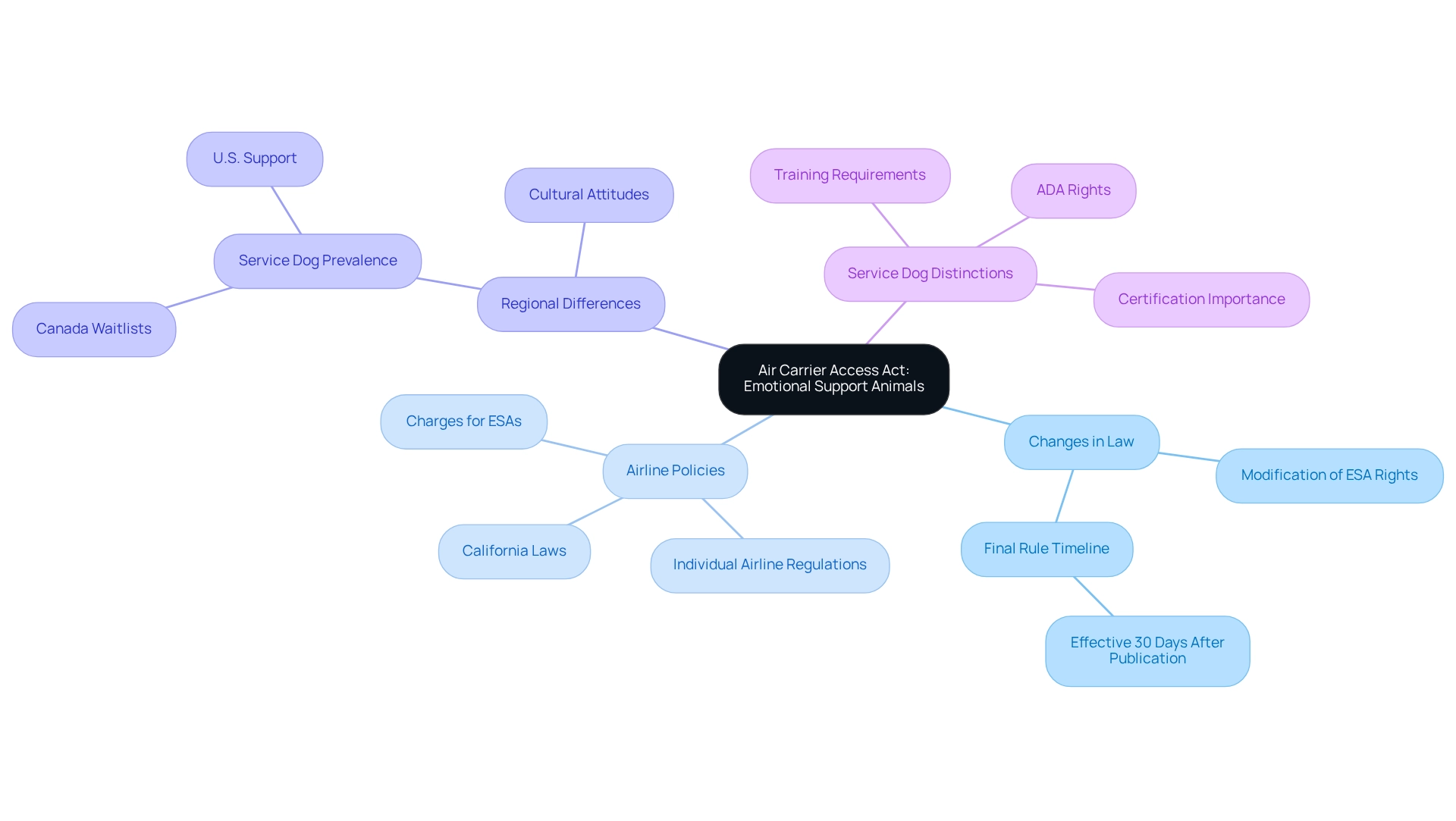
ESA Documentation Requirements in California: What You Need to Know
In California, understanding the laws regarding emotional support animals is essential for individuals seeking to acquire a legitimate emotional assistance creature (ESA) letter for the companionship of their beloved pets. Many individuals face emotional challenges that can feel overwhelming, and having an ESA can provide much-needed support. To qualify, individuals must secure a letter from a licensed mental health professional. This letter should include vital details such as the professional’s license number, the patient’s name, and a clear statement outlining the individual’s need for the ESA. Recent legislation, AB 468, emphasizes the importance of a thorough evaluation process as required by California laws regarding emotional support animals, stating that this letter must be issued following a minimum 30-day therapeutic relationship with the provider.
Proper documentation is vital for ESA owners to assert their rights under California laws regarding emotional support animals, particularly the Fair Housing Act. Research has shown that emotional assistance animals can significantly alleviate symptoms of mental health conditions, enhancing both emotional and physical well-being. In California, the issuance of valid ESA letters has seen a significant rise, with thousands provided by licensed experts, which highlights the growing need for emotional support animals under California laws. For instance, Wellness Wag has an average rating of 4.57 stars from 198 reviews, indicating user satisfaction and the trustworthiness of their offerings.
When traveling with an ESA, it’s crucial to be aware of airline policies. Have you ever wondered what it takes to travel with your furry friend? For example, Air Canada’s travel requirements state that pet carriers count toward the airline’s carry-on baggage allowance, allowing only one cat or small dog in the cabin. Pets must be at least 12 weeks old and fully weaned, remaining inside their pet carrier at all times. Travelers should arrive at least 30 minutes early for check-in, as pets cannot be checked in at self-service kiosks. This information is vital for ESA owners planning to travel, ensuring compliance with airline regulations.
Instances of valid ESA letters generally feature the date of issuance, the mental health professional’s contact details, and a description of the patient’s condition that necessitates the assistance creature. Furthermore, it is essential to understand the distinctions between emotional assistance creatures and working dogs, as the latter possess different legal rights and access privileges. As Billie Sue Coleman observed, “I am so grateful to have one place to go to for my Service Dog assistance.” She appreciates the thorough assessment procedure, helpful staff, and resources available to individuals seeking a service companion. This comprehensive approach ensures that individuals can navigate housing and travel challenges effectively, reinforcing the critical role of emotional assistance animals in mental health care.
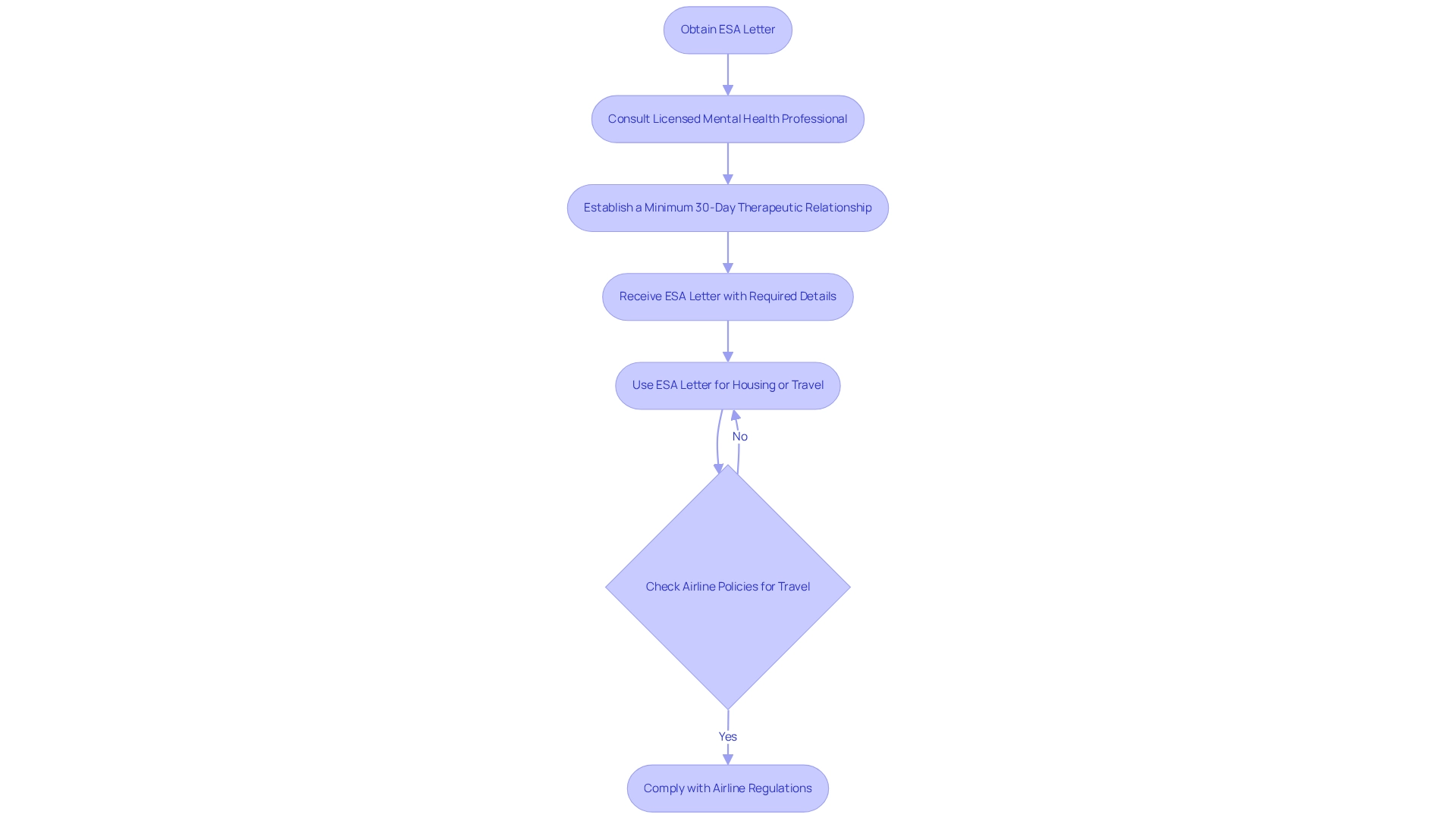
Licensed Professionals: The Backbone of Valid ESA Letters in California
Licensed mental health professionals play a crucial role in helping individuals obtain a valid Emotional Support Animal (ESA) letter under California laws for emotional support animals. These dedicated professionals deeply understand their clients’ mental health needs. At Wellness Wag, we strive to simplify this process through a personalized assessment that begins with a brief evaluation of your unique situation and emotional assistance needs.
Once you submit the required forms, you will be connected with a licensed medical doctor for a thorough consultation to assess your eligibility for an ESA, in line with California laws regarding emotional support animals, where a network of over 100,000 licensed mental health professionals is ready to support individuals seeking ESAs. The evaluation process typically involves direct observation of the client-pet interaction, which is vital for understanding the pet’s impact on the individual’s mental well-being. This comprehensive approach is reinforced by case studies that illustrate the positive effects of pet companionship on conditions such as anxiety, depression, and PTSD. Assessing the interaction between the client and their pet is essential to determine whether the pet provides a clearly positive effect on the individual’s mental health.
Experts emphasize the importance of maintaining the integrity of the therapeutic process when issuing ESA letters. Therapists must carefully navigate the complexities of documentation, ensuring that clients receive the necessary assistance while avoiding potential conflicts of interest. It’s also important for them to refrain from providing additional documentation or acting as mediators in disputes, as this can complicate the therapeutic relationship.
As California laws on emotional support animals evolve, particularly with updates to the Air Carrier Access Act, the role of licensed professionals remains pivotal in advocating for the rights of individuals facing mental health challenges. Their expertise not only facilitates access to essential arrangements but also reinforces the validity of the emotional support provided by these animals.
In summary, ESA letters are a vital component in acquiring an emotional support animal, as emphasized by mental health specialist Brenda Mejia.
Public Access Rights: Where Emotional Support Animals Are Allowed
In California, laws regarding emotional support animals (ESAs) impose significant restrictions on their public access compared to assistance animals. Unlike assistance animals, which enjoy broad access rights under the Americans with Disabilities Act (ADA), ESAs are often prohibited in many public spaces, including restaurants, retail shops, and public transport. This distinction is vital for ESA owners, as it requires a clear understanding of where their beloved companions can accompany them.
While there is no legal requirement for assistance dogs to be certified or registered, obtaining certification from recognized organizations can lend credibility and ensure that the assistance dog has received proper training. This certification can also help dog owners navigate public spaces more effectively. Assistance dog owners benefit from full public access rights, allowing them to bring their assistance dogs into various public areas and secure housing accommodations, even where pets are typically not allowed. This legal framework underscores the importance of recognizing the differences between assistance dogs and emotional support animals as defined by California laws regarding emotional support animals.
The limitations on ESAs stem from their classification as pets rather than service animals, which are trained to perform specific tasks for individuals with disabilities. Consequently, ESA owners must navigate a complex landscape of compliance issues, often leading to misunderstandings with business owners and staff. For instance, while ESAs can provide emotional support, they lack the same legal protections in public places, creating challenges for those seeking companionship in social settings.
Recent statistics reveal that approximately 80% of public venues in California do not allow ESAs, emphasizing the need for awareness among owners. Legal experts stress that understanding California laws regarding emotional support animals is crucial for preventing potential conflicts and ensuring compliance with local regulations.
Case studies highlight the essential role ESAs play in supporting individuals facing mental health challenges, such as anxiety and PTSD. One study illustrated a situation where an ESA owner faced eviction due to a misunderstanding about their rights, emphasizing the necessity for clear communication with landlords and businesses. As Dr. Athena Angela Gaffud, a DVM, notes, “ESAs help improve the quality of life by promoting a holistic approach to therapy, enabling individuals to thrive with emotional and psychological support from their pet companions.”
In conclusion, while ESAs offer invaluable emotional support, their public access rights are restricted by California laws regarding emotional support animals. Owners must stay informed about where their animals are permitted and the legal implications of these restrictions to ensure a positive experience. Remember, you are not alone in this journey; understanding and support are available to help you navigate these challenges.
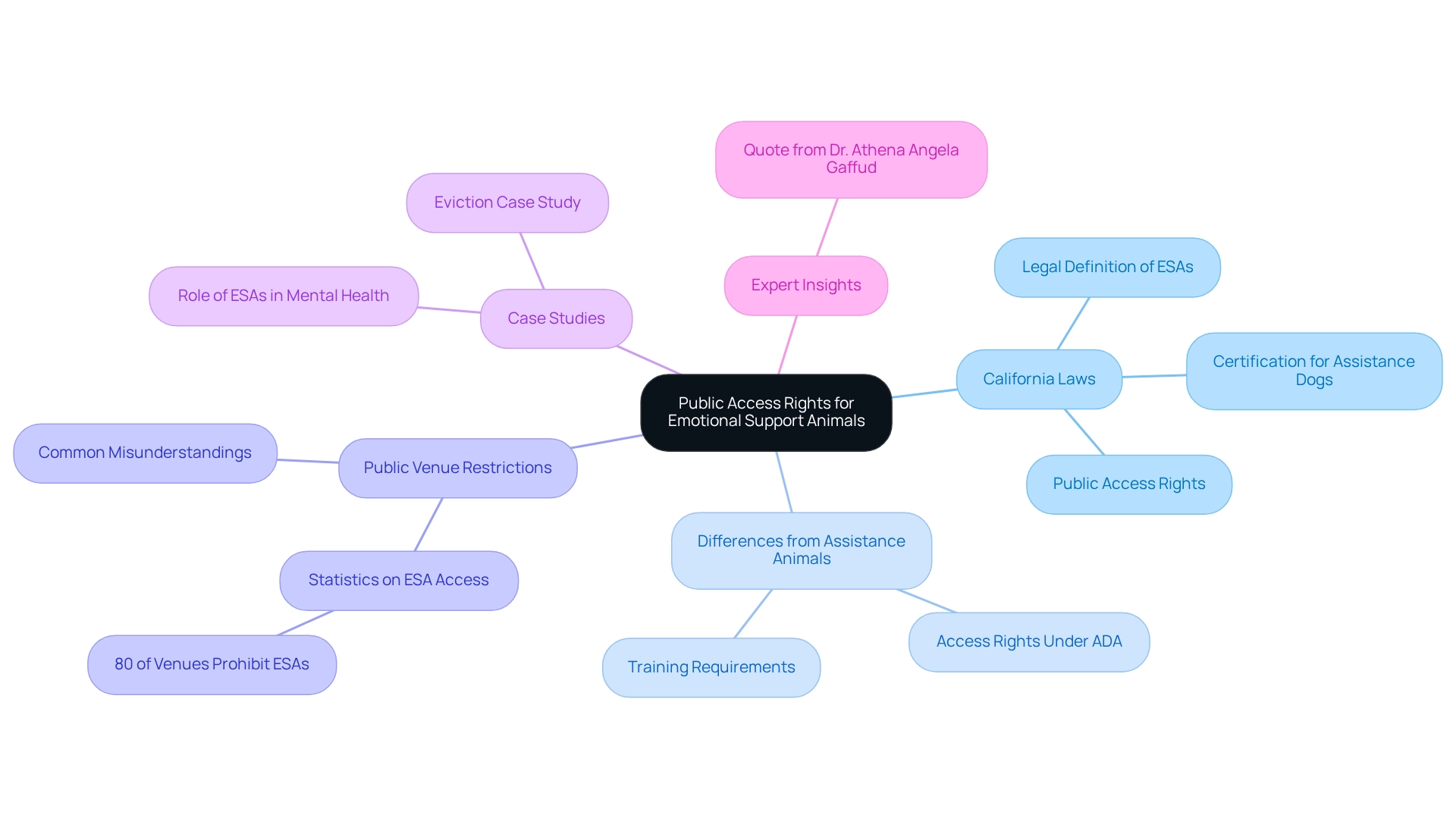
Housing Provider Responsibilities Under California ESA Laws
Under California laws emotional support animals, housing providers are required to accommodate tenants with valid Emotional Support Animal (ESA) letters, even in properties that enforce no-pet policies. This legal framework is vital as it allows individuals facing mental health challenges to experience the companionship of their emotional support animals in accordance with California laws emotional support animals without additional barriers. Importantly, california laws emotional support animals dictate that landlords cannot impose extra fees or deposits specifically for ESAs, alleviating financial burdens on tenants. However, they do have the right to request documentation to verify the authenticity of the ESA letter.
Understanding these responsibilities is crucial for ESA owners, empowering them to advocate for their rights in housing situations under California laws regarding emotional support animals. Recent discussions among housing advocates highlight the necessity for landlords to familiarize themselves with California laws regarding emotional support animals, which is essential for fostering positive landlord-tenant relationships. For instance, there are successful cases where landlords have embraced their responsibilities, leading to harmonious living arrangements that respect both tenant rights and property regulations.
Statistics indicate that disputes over ESA letters are not uncommon, with approximately 30% of housing disputes involving issues related to ESA letters. This highlights the importance of clear communication and understanding between tenants and landlords. As of 2025, compliance rates among landlords with California laws emotional support animals have shown improvement, with around 75% adhering to these regulations. However, challenges remain. It is essential for ESA owners to be informed about their rights under California laws regarding emotional support animals, while landlords should actively engage in practices that support these rights, ensuring a comfortable and legally compliant living environment for everyone involved.
Furthermore, while assistance dogs are not mandated to be certified or registered, acquiring certification can offer credibility and ensure that the assistance dog meets specific training criteria. Assistance dog owners enjoy full public access rights under the Americans with Disabilities Act (ADA), allowing them to bring their assistance dogs into public spaces, including restaurants and stores. Understanding the distinction between service dogs and emotional assistance animals is vital for recognizing the legal rights and access each type of aid animal possesses. This further emphasizes the importance of landlords being proactive in recognizing their responsibilities under the Fair Housing Act and the Air Carrier Access Act, particularly in light of California laws regarding emotional support animals, which provide legal protections for ESA owners. As Zoe Harper, a marketing specialist, observes, “It is essential for property owners to examine their insurance policies to guarantee they offer protection for damages caused by pets or emotional assistance animals.” This underscores the importance of landlords being proactive in understanding their responsibilities.
Financial Considerations: Costs and Insurance for Emotional Support Animals
Considering the journey of owning an emotional support creature (ESA) involves several financial aspects that potential owners should thoughtfully evaluate. The typical cost of obtaining an ESA letter in California is around $150, aligning with the common range of $100 to $200 depending on the provider. However, with Wellness Wag, you can begin your journey for as little as $32.25, thanks to our interest-free payment plans that allow you to spread your payment into four manageable installments. When checking out, you can choose our financing option, making this initial investment more accessible. It’s also important for ESA owners to consider ongoing expenses such as regular veterinary care, food, and other essential pet-related needs.
While landlords cannot impose pet fees for ESAs, they may still request liability insurance to cover any potential damages caused by the pet. This insurance can introduce an additional layer of cost, which is crucial for safeguarding housing rights under California law. Practicing responsible behavior and providing proper care are vital in ensuring that these rights are respected.
Moreover, it’s essential to reflect on the overall financial implications of caring for an ESA. For instance, consultations with licensed mental health professionals for ESA letters can range from $75 to $250 per session, along with annual renewal fees. These expenses can accumulate, making it necessary for potential ESA owners to budget carefully. Wellness Wag offers a 100% money-back guarantee, ensuring satisfaction in the ESA letter approval process, which can help ease some financial worries.
A case study illustrates that while the emotional benefits of having an ESA can be profound, the financial responsibilities of their care should not be underestimated. For example, one individual discovered that their initial excitement about adopting an ESA was tempered by the realization of ongoing costs, prompting them to create a detailed budget to manage their finances more effectively. This experience underscores the importance of understanding the financial landscape of ESA ownership and how Wellness Wag’s services can assist owners in navigating these challenges. Financial advisors recommend allocating a specific budget for ESA-related costs to ensure that owners can meet their companion’s needs without compromising their financial stability. In summary, understanding California laws regarding emotional support animals is crucial for potential owners. By planning for both initial costs and ongoing expenses, individuals can embrace the emotional support that these animals provide while ensuring their well-being. Developing a detailed budget plan that encompasses both initial and ongoing costs can empower potential ESA owners to manage their finances effectively.
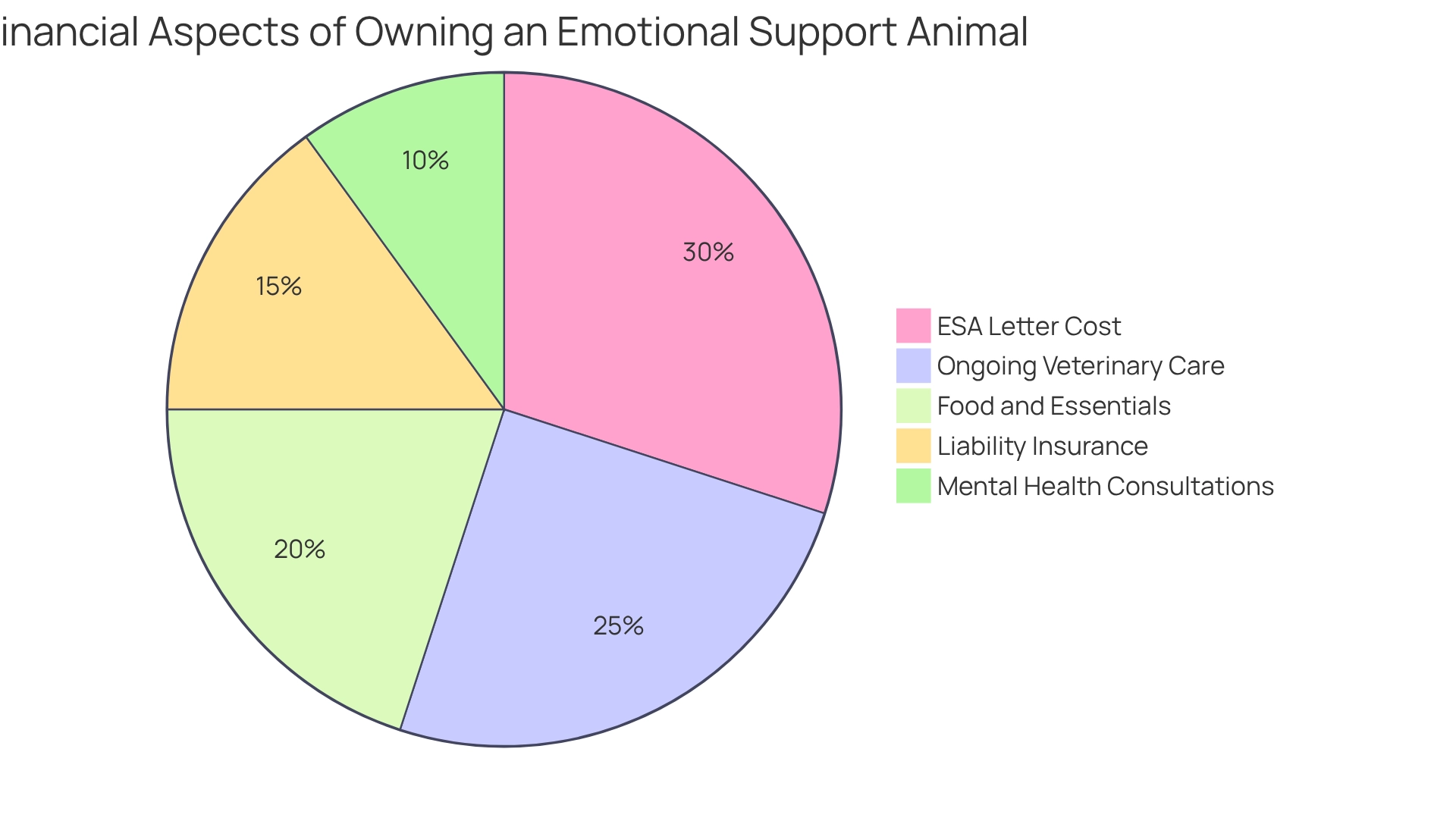
Conclusion
Obtaining an Emotional Support Animal (ESA) letter in California is a significant step for individuals yearning for the companionship these animals offer. As you navigate through emotional challenges, it’s essential to know that Wellness Wag is here to simplify the process of acquiring valid ESA letters. The recent California Assembly Bill 468 highlights the importance of a genuine therapeutic relationship with licensed professionals, ensuring that those with real emotional needs can access this vital support.
Understanding the distinctions between service animals and ESAs is crucial, especially regarding their public access rights and housing accommodations. While ESAs provide profound emotional support, they do not possess the same legal protections as service animals, which can lead to challenges in public spaces. The Fair Housing Act plays a vital role in safeguarding ESA owners’ rights, allowing them to secure housing without incurring additional fees or restrictions.
As the landscape of ESA regulations evolves, it is vital for prospective owners to remain informed about their rights and the financial responsibilities involved in caring for these beloved animals. By grasping the legal framework and necessary documentation, you can navigate the complexities of ESA ownership with confidence and clarity.
In conclusion, the companionship of an emotional support animal can significantly enhance the quality of life for those facing emotional challenges. With the right knowledge and resources, you can successfully integrate these cherished companions into your life, ensuring compliance with relevant laws while reaping the emotional benefits they provide. Remember, you are not alone on this journey; support is available, and your emotional well-being matters.
Frequently Asked Questions
What is Wellness Wag and what services do they offer?
Wellness Wag is a service in California that helps individuals obtain Emotional Support Animal (ESA) letters through a user-friendly process that adheres to California laws regarding emotional support animals.
How does the process of obtaining an ESA letter through Wellness Wag work?
The process begins with a brief assessment to determine eligibility, followed by a consultation with licensed medical professionals. After placing an order, clients receive a confirmation email, and the official ESA letter is typically delivered within 24 hours of approval.
Why is the quick delivery of ESA letters important?
Quick delivery is crucial for individuals facing housing restrictions or travel challenges related to their mental health conditions, as timely access to an ESA letter can significantly enhance their quality of life.
What are the new regulations introduced by California Assembly Bill 468 regarding ESA letters?
Assembly Bill 468, effective January 1, 2022, requires individuals seeking an ESA letter to establish a 30-day relationship with a licensed mental health professional and mandates a thorough clinical evaluation before issuing an ESA letter to combat fraudulent practices.
How has AB 468 impacted the issuance of ESA letters?
The implementation of AB 468 has led to a significant decrease in fraudulent ESA letters, ensuring that only individuals with genuine emotional or psychological needs can obtain them, thus enhancing the legitimacy of the process.
What are the penalties for misrepresenting an emotional support animal in California?
The civil penalty for misrepresenting an emotional support animal starts at $500 for the first infraction, increasing to $1,000 for the second and $2,500 for the third and subsequent violations.
What is the difference between service animals and emotional support animals?
Service animals, particularly trained dogs, have public access rights under the Americans with Disabilities Act (ADA) and assist individuals with disabilities, while emotional support animals provide therapeutic benefits through companionship but do not have the same public access privileges.
What protections do emotional support animals have under California law?
Emotional support animals are protected under the Fair Housing Act, which allows individuals to seek reasonable accommodations in pet-restricted housing, provided they have the necessary documentation.
Why is it important to understand the differences between service animals and emotional support animals?
Understanding these differences is essential for ESA owners to navigate housing and travel regulations effectively, ensuring they comply with legal requirements and protect their rights.
How can individuals interested in obtaining a legitimate ESA letter contact Wellness Wag?
Individuals can reach out to Wellness Wag by sending an email to [email protected] for any questions or to initiate the process of obtaining an ESA letter.
Certify Your Emotional Support Animal Today

Why You Can Rely on Us?
At Wellness Wag, we believe your pet deserves care rooted in both science and compassion. Each article is carefully researched, written in clear language for pet owners, and then reviewed by qualified professionals to ensure the information is evidence-based, current, and practical for real-life care. Our goal is to help you feel confident in making informed decisions about your pet’s health and well-being.
Reviewed by
Angela Morris, MSW, LCSW
Angela is a licensed clinical social worker with 20 years of experience in patient advocacy and community mental health. She has assisted numerous clients with ESA evaluations and brings a deep understanding of disability accommodations, ensuring that all information is accurate, supportive, and practical.

Written by :
Lena Park
Last Updated :
July 10, 2025












